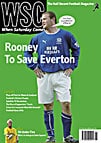 Archie MacGregor believes Berti Vogts’ forward thinking is the one thing going for the German, but Scotland’s topsy-turvy play-off defeat to Holland was a dismal throwback
Archie MacGregor believes Berti Vogts’ forward thinking is the one thing going for the German, but Scotland’s topsy-turvy play-off defeat to Holland was a dismal throwback
Ah, the roller-coaster ride that is the lot of the Scotland supporter. From exultant, wide-eyed optimism to the pits of despair in four days. Wasn’t this sort of thing supposed to have been banished once and for all after Argentina 78?
At least this outcome was in line with diminished expectations. But after two decades of carefully cultivated steadfastness where Scotland, with only the odd exceptions, ran up sensible victories and equally sensible defeats, it was a shock to be reacquainted with anarchic self-destruction. All this under a German.
Poor Berti. After gradually earning a degree of respect he is once again getting it firmly in the neck. Results are everything but, lacking the charm and pseudo-intellectualism of Sven-Göran Eriksson, his record as a coach is laid bare. To some there is difficulty in dispelling the notion that he arrived as damaged goods. Responsible for precipitating the long decline of the once imperious German nat- ional team to the extent that they even began losing matches to England again. Unable to do the business at Bayer Leverkusen. A man so in demand that he was in charge of Kuwait when Scottish Football Association chief executive David Taylor came calling.
It could be said that Berti’s performance to date hardly warrants that a charge of shame be directed towards his detractors. Starting in March 2002 with a 5-0 gubbing in Paris and ending with a 6-0 gubbing in Amsterdam, you might feel a need to start rummaging for the self-help manuals to put a positive spin on things. In between there has been some pretty inedible filling. It took five games before Vogts managed a victory, against a Hong Kong XI, an ensemble so motley FIFA would not deign to recognise the match as a full international. If that one had gone belly up the rumour was Berti had arranged a bounce game against Auchinleck Talbot in an attempt to get that elusive win.
Never one to shy away from embarrassment, the friendlies have just kept on coming and, while the scorelines may suggest a semblance of respectability, the performances against teams such as Denmark, Republic of Ireland and Austria were mind-numbingly wretched even by our standards. For Craig Burley, once a gap-toothed Tartan Army standard bearer, one look at Vogts’ set-up in the ill-fated Austria contest was enough to send him scurrying off into retirement.
When it came to the real deal of the qualifiers, there was the near fiasco in the Faroes in the opening game. Two goals down after 13 minutes, it looked as though what remained of Scottish football’s crumbling edifice was about to tip over the cliff-top in Toftir and crash into the north Atlantic. Somehow a draw was salvaged, but the mantra about there being no easy games in international football these days – surely now holed below the waterline after events in Amsterdam – can hardly disguise the fact that this was the only point gained by the Faroes throughout the Euro 2004 qualifying campaign. The defeat in Lithuania was only surpassed in its bleakness by the sub-zero temperatures.
Suspicions that Vogts had never found the plot, let alone lost it, were seldom far away. His squad selections and tactics seemed to be all over the shop. I give you Warren Cummings, Graham Alexander and Scott Dobie. If any of them reaches 50 caps and the Hall of Fame, I’m Ruud van Nistelrooy. Communication, or lack of it, was cited by refuseniks such as Burley. It was not so much the language barrier (Berti hardly comparing poorly in his grasp when set alongside assistant Tommy Burns), just a complete failure to get over what he expected players, often fielded out of position, to do.
For all that, there are no lynch mobs out on the street. It would be mean-spirited to attribute this to post-Argentina indifference or lack of any plausible alternatives. While excellent home performances against Germany and Holland have been firmly put in context, they did provide flashes of bravado which most felt had been long since extinguished from the Scottish game. More than anything, however, it is the sense that under Vogts, along with Rainer Bonhof at the Under-21s, some attention and belief is at last being invested in nurturing young talent that grants him breathing space. The emergence of James McFadden, Darren Fletcher and Stephen Pearson is a sign of genuine hope. In the days of Craig Brown, whose notion of giving youth a chance was to tell them to come back in five years’ time, it is almost inconceivable that any of the aforementioned trio would have earned their first cap yet.
Bonhof’s charges may also have failed to reach their Euro 2004, but this was against a backdrop of the Under-21s having persistently floundered in recent years. His good work has not gone unnoticed and there is speculation that he may soon move on to a more elevated post in the near future. Some might even say it ought to be the post currently occupied by his good friend, Herr Vogts.
From WSC 203 January 2004. What was happening this month